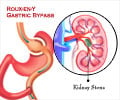Study explores impact of weight loss on cancer risk

‘Surgery may provide additional benefits like improved quality of life and decreased long-term healthcare costs’
Read More..




Dr. Vinod K Rustgi, study author, says, "We knew that obesity leads to certain problems, including cancer, but no one had ever looked at it the other way around--whether weight loss actually reduced the risk of those cancers." Read More..
The retrospective study analyzed data of over 98,000 privately insured individuals aged 18 to 64 diagnosed with severe obesity and NAFLD. Of those, 34.1 percent had bariatric surgery.
Findings revealed that risk of all cancers was reduced by 18%, but risk of obesity-related cancers in particular was reduced by 25%. For cirrhotic patients, cancer risk reduced by 38% and for non-cirrhotic patients, cancer risk reduced by 52%.
Bariatric surgery was found to be associated with significant risk reductions for the following obesity-related cancers:
1) Colorectal,
Advertisement
3) Endometrial and thyroid cancers,
5) Multiple myeloma.
"Understanding the connection between NAFLD and cancer may identify new targets and treatments. Though bariatric surgery is a more aggressive approach than lifestyle modifications, surgery may provide additional benefits, such as improved quality of life and decreased long-term healthcare costs," the authors state.
Dr. Rustgi says the next step is to explore whether this reduced cancer risk holds true for severely obese individuals without NAFLD and to study the mechanism by which this reduced risk occurs. Further, the researchers are now studying the impact of bariatric surgery on cardiovascular outcomes, like a decrease in heart attacks or strokes.
Source-Medindia















